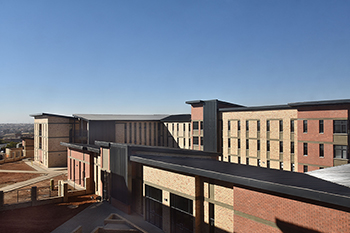Latest News Archive
Please select Category, Year, and then Month to display items
27 October 2025
|
Story Sefako Mokhosoa
|
Photo Supplied
 Ten Grade 12 learners from Mampoi Secondary School in Phuthaditjhaba.
Ten Grade 12 learners from Mampoi Secondary School in Phuthaditjhaba.
On 1 October 2025, the Projects and Innovation Directorate in the Faculty of Education at the University of the Free State (UFS) proudly hosted a certificate ceremony to honour ten Grade 12 learners from Mampoi Secondary School in Phuthaditjhaba on the Qwaqwa Campus. These learners completed a Skills Development Initiative and Workshop Series focused on digital literacy and ICT skills – a programme designed to equip rural youth with the tools they need to thrive in a digital world.
The initiative, which ran from May to August 2025, was made possible through a strategic partnership with BANKSETA to bridge the digital divide in rural communities. The learners received hands-on training in essential digital tools. Each learner also received a tablet to support continued learning and personal growth beyond the classroom.
The Director of the office in the Faculty of Education, Dr Kwazi Magwenzi, stressed that digital skills promote independence and self-directed learning. “Grade 12 is a time when learners should manage their studies, meet deadlines, and explore their options,” she said. “Digital fluency supports that autonomy. It enables learners to use online research, interactive tools, e-learning, and collaboration platforms to make learning more effective, flexible, and aligned with their pace and style. In Grade 12, where the stakes are high – with exams, tertiary entrance, and career choices – this ability helps learners become more self-directed, confident, and equipped.”
The programme not only built learners’ confidence in using ICT tools for learning and communication but also prepared them for the technologically driven environments they will encounter in institutions of higher learning.
Beyond developing digital skills, the project offered learners valuable exposure to the university environment, as their training took place on campus. Inspired by the success of this pilot, the Faculty of Education now aims to expand the initiative to reach more schools and learners across the region. The vision is to scale up access to digital education and empower more young people in rural areas with the skills necessary for academic and professional success.
This ceremony marked the conclusion of a successful training programme and the beginning of a long-term commitment to digital empowerment and lifelong learning in rural communities.
First residence for UFS South Campus
2016-09-01

The residence has 146 double rooms with 17 kitchens
overall, each corridor has one kitchen. The residence
also has a gazellie and a conference room that
can accommodate 50 people.
Photo: Charl Devenish
The South Campus of the University of the Free State in Bloemfontein now has its own student residence. Completed in June 2016, the new residence can accommodate 250 undergraduate and 20 postgraduate students.
The residence has 270 beds, with 20 single-bedroom flats and 12 additional single rooms in the corridors. Each of these single-bedroom flats has a kitchen, lounge, and a bathroom. There are 146 double rooms with 17 kitchens overall, each corridor has one kitchen. The residence also has a gazellie, a conference room that can accommodate 50 people, as well as eight laundry rooms with a drying area.
“Students at the South Campus have, up until now, been commuting from the Bloemfontein Campus and residential areas around town. We are extremely proud that accommodation will now be available to our students on the campus. Although the official opening of the residence is said to take place early in 2017, some students have already moved in,” says Prof Daniella Coetzee, Principal of the South Campus.
The residence was built at a cost of R57 million, which was funded by the UFS and the Department of Higher Education and Training.
Residence accessible to differently-abled people
The UFS strives to cater for differently-abled people by making all its buildings accessible to them. This residence is no exception, as it has two rooms available on the ground floor of Block C for differently-abled students. These rooms accommodate two students per room.
A one-of-a-kind newly installed water system
The residence is also the first at the university that has a grey-water system installed. Grey water is made up of bath, shower, and bathroom sink water. The water will then be reused for toilet flushing as well as for irrigation purposes on the campus.